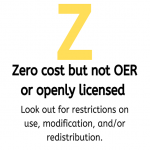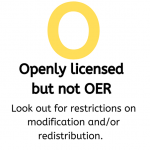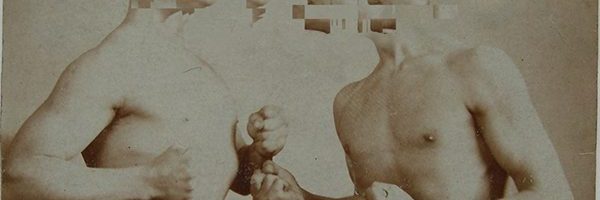Developed by Jessica Wagner Webster, Digital Initiatives Librarian, Baruch College, CUNY
As part of her course, Library 3010- Digital Traces: Memory in an Online World, Professor Wagner essentially needed to use Zero Textbook Cost sources because no single textbook would cover the breadth of content she wanted to discuss.
The oer & Course Artifact
![]() Since Professor Wagner’s course is tied to current events and topics in the news, textbooks were rarely able to keep up with contemporary discussions on digital archives and society. And, since very few courses are taught in this discipline, particularly at the undergraduate level, no true OER texts have been developed. Therefore the content for the “zero textbook cost” course suggested by Professor Wagner (below) is a combination of articles held by library journals, and articles in popular magazines and newspapers. A few excerpts from her curated articles, videos, and radio programs, that she supplemented with assignments and project, are listed below.
Since Professor Wagner’s course is tied to current events and topics in the news, textbooks were rarely able to keep up with contemporary discussions on digital archives and society. And, since very few courses are taught in this discipline, particularly at the undergraduate level, no true OER texts have been developed. Therefore the content for the “zero textbook cost” course suggested by Professor Wagner (below) is a combination of articles held by library journals, and articles in popular magazines and newspapers. A few excerpts from her curated articles, videos, and radio programs, that she supplemented with assignments and project, are listed below.
Sample Readings:
- Processing the Past: Contesting Authority in History and the Archives by Francis X. Blouin, Jr. and William G. Rosenberg (available through the Baruch Library)
- “The Whole Haystack” by Mattathias Schwartz from The New Yorker
Sample activities :
- Class Activity 1: After reading and discussing issues around format migration, bit rot, and digital access and preservation, I presented the class with an example activity where they had to decide in groups which files to accession into a hypothetical archival collection.
- Class Activity 2: Following discussion of a chapter from Processing the Past: Contesting Authority in History and the Archives by Francis X. Blouin, Jr. and William G. Rosenberg, focusing on who has the power to collect or silence via keeping archival records, and what agenda might be present in deciding what to collect, I had students work in groups and use several examples to consider whose point of view might be left out of the archival record.
- Class Activity 3: Following a discussion of the article “The Whole Haystack” from The New Yorker, about how the NSA uses a technique of large-scale records aggregation in its attempt to catch terrorists, I asked students to consider such a system from an archivist’s point of view: how to design and implement a system that would collect, describe, store, and provide accurate access to so much data, following archival principles.
For extended activity directions, see this PDF (CC-BY-NC-SA): Digital Traces: Class Activities 1-3
transitioning to and Teaching with oer
Professor Wagner built her syllabus by identifying key principles in the digital archives world that she wanted to teach, and selected several major current events that would allow her to showcase how digital archives play out in the world. She then did research to identify readings that would help her illustrate these themes. Because much of these topics are about how archivists care for digital material, or are about who has the power to make archival decisions and what the implications are for those power differentials, it was important for her students to do hands-on exercises to walk through sample scenarios for themselves. The assignments and projects she developed allowed students to do this hands-on work.
Faculty Information
Jessica Wagner Webster is the Digital Initiatives Librarian at Baruch College, City University of New York (CUNY). She holds a Masters in Library Science (Archives Concentration) as well as a Masters in History from the University of Maryland. Her responsibilities include selecting materials for digitization; locating and accessioning born-digital collections; designing workflows to support processing; managing digital archives projects; and creating systems to ensure both access to and long-term preservation of digitized and born-digital materials. She also co-leads the implementation team for CUNY’s institutional repository. She has developed and taught a course on digital archives and society at Baruch College, and has presented widely on a variety of topics. Her research focuses on trends in archival work and on documenting underdocumented populations.
Licensing Information
![]() The approach and activities for the Digital Traces: Memory in an Online World course are licensed under a Creative Commons Attribution-NonCommercial-ShareAlike 4.0 International License.
The approach and activities for the Digital Traces: Memory in an Online World course are licensed under a Creative Commons Attribution-NonCommercial-ShareAlike 4.0 International License.
 The suggested readings linked above (Processing the Past and “The Whole Haystack”) are zero cost but not openly licensed or OER.
The suggested readings linked above (Processing the Past and “The Whole Haystack”) are zero cost but not openly licensed or OER.
 The class activity worksheets linked above are openly licensed but not OER.
The class activity worksheets linked above are openly licensed but not OER.

